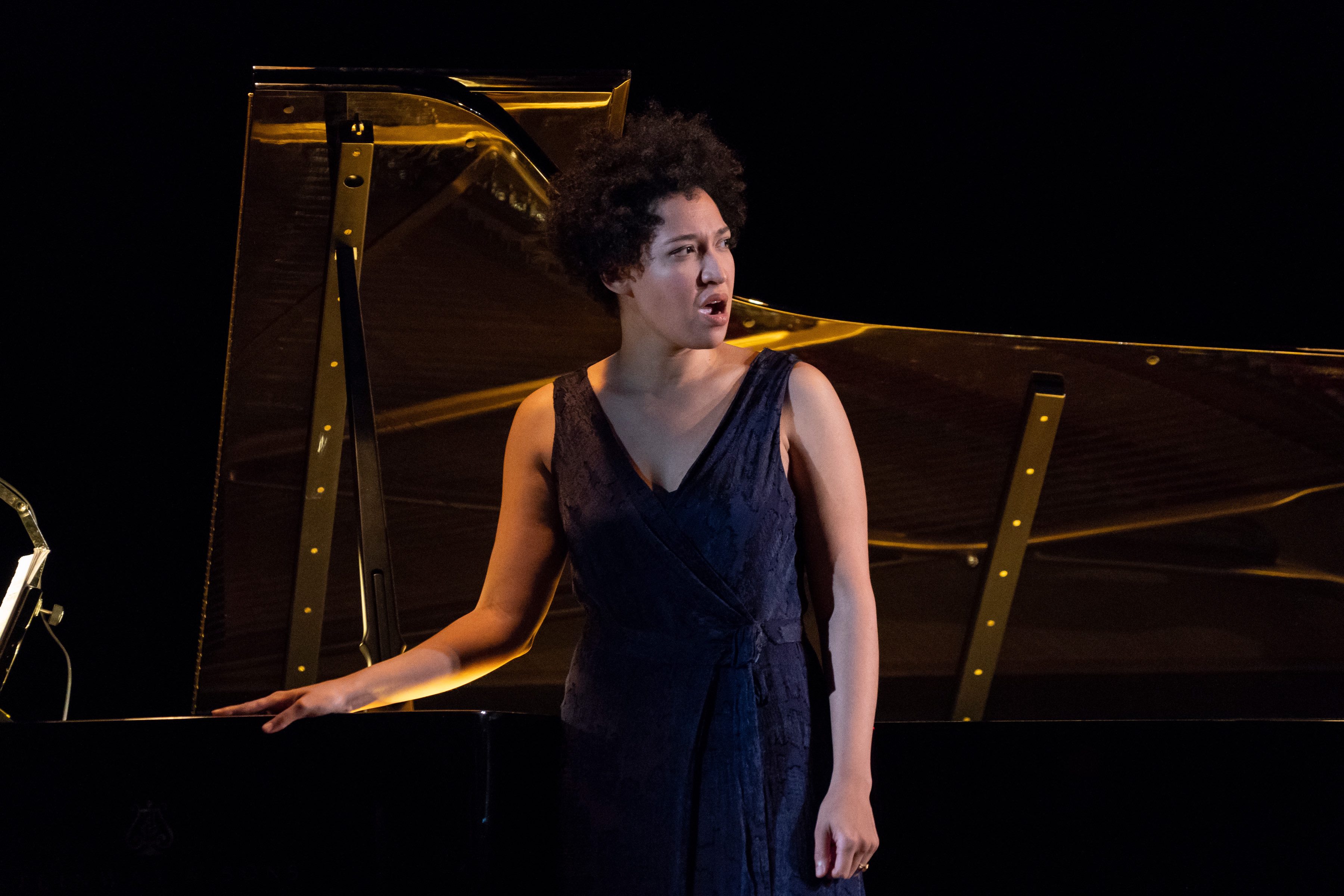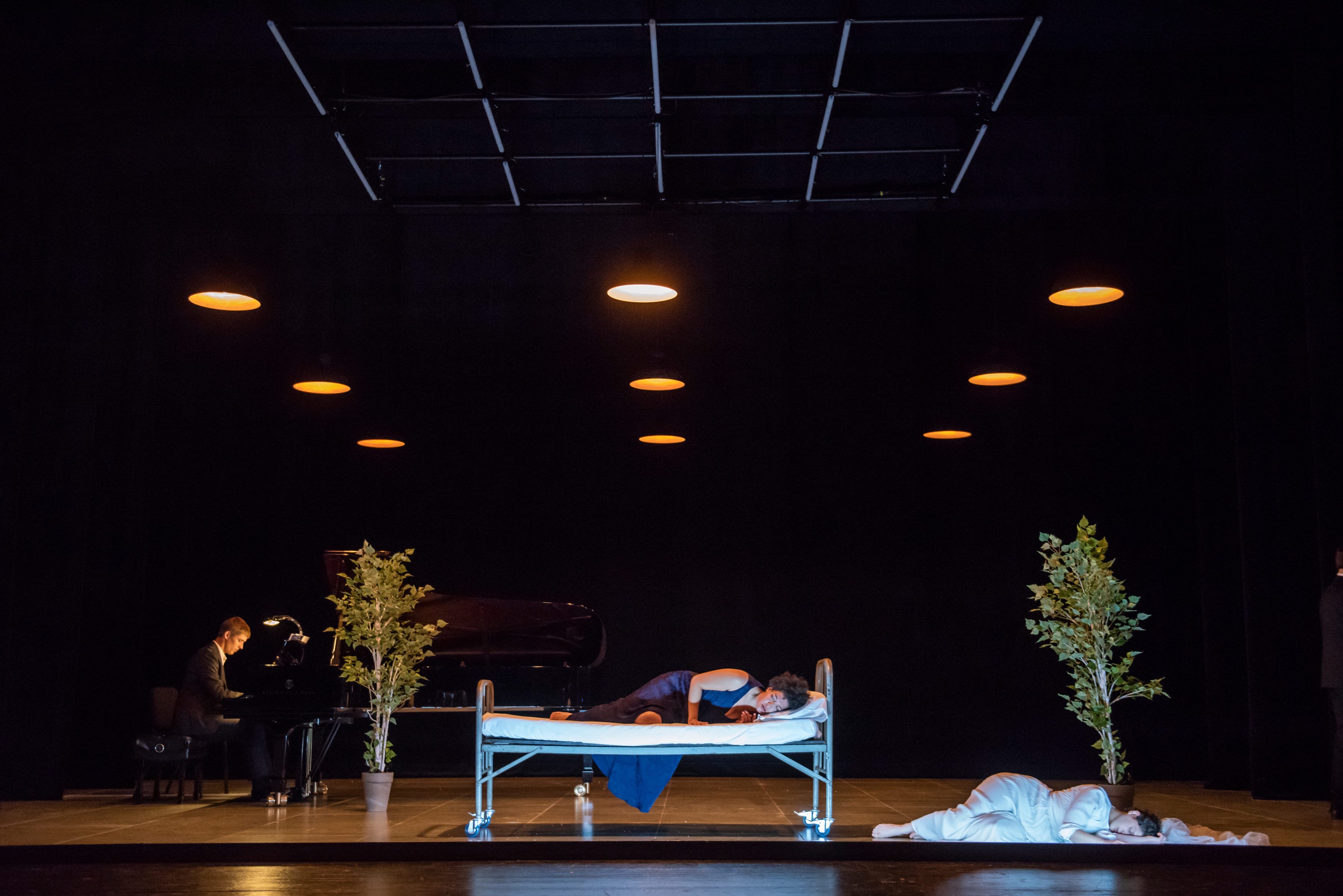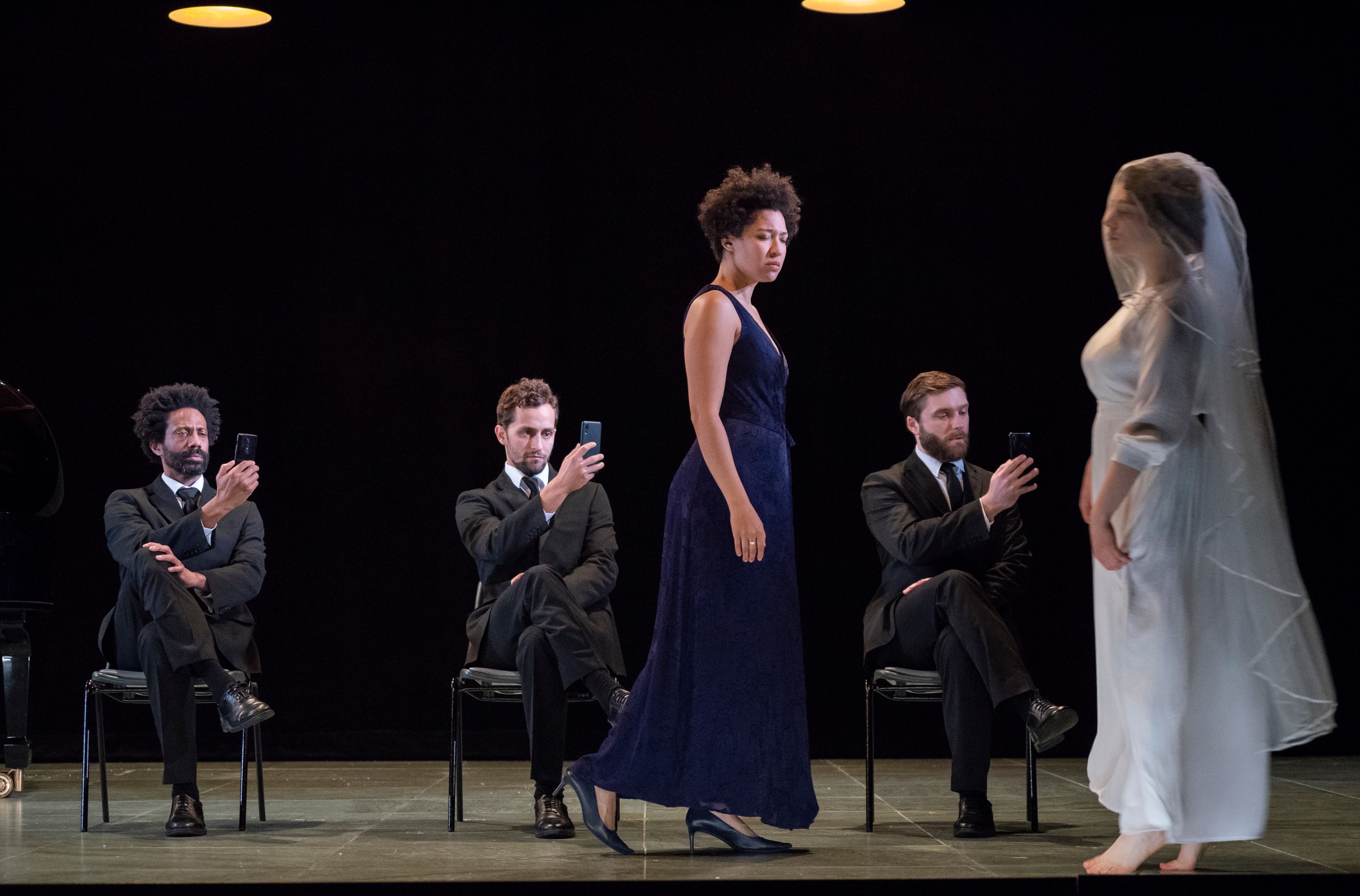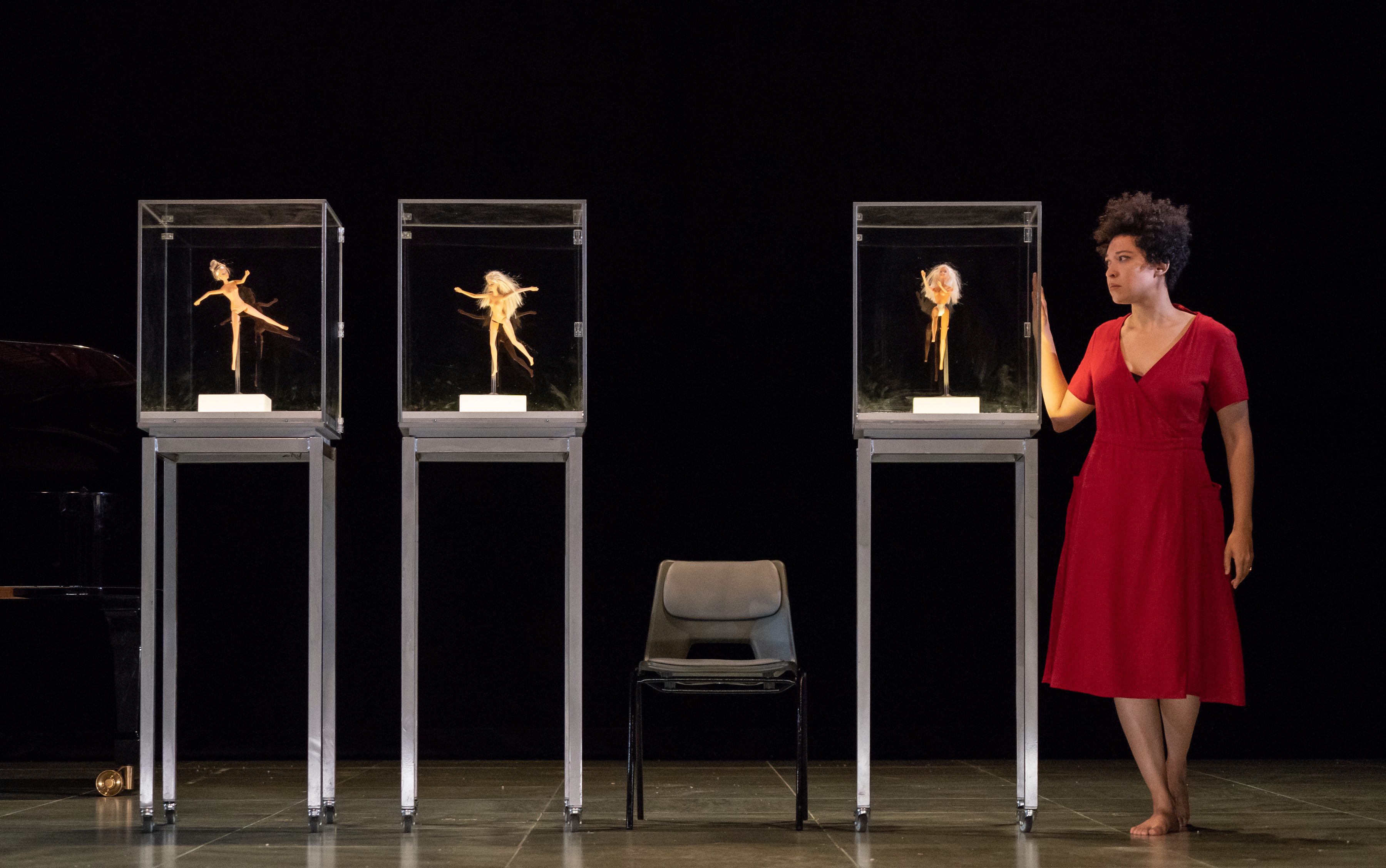What does a 19th-century song cycle have to say to us today? With feet planted firmly in a world where girls are all named for flowers and “herz” (heart) is a convenient rhyme for “schmerz” (pain), not that much one might suppose. Katie Mitchell, Martin Crimp and Bernard Foccroulle, however, are prepared to argue otherwise and Zauberland (Magic Land), playing as part of Lincoln Center’s 10th White Light Festival, is the frequently traumatic and endlessly thoughtful result. A deep dive into Schumann’s Dichterliebe, it is also a meditation on the current refugee crisis and the power of the subconscious, employing the extraordinary talents of soprano Julia Bullock and pianist Cédric Tiberghien in an immersive experience that marries a controlled musical integrity with boundless theatricality.
 Julia Bullock in Zauberland. Photo © Stephanie Berger
Julia Bullock in Zauberland. Photo © Stephanie Berger
The program note gives us a backstory: a young woman is forced to leave her husband and family in Syria for a life in Germany. Settled in Cologne, she gives birth to a daughter and resumes her career as an opera singer. The events we see on stage are a combination of memory and dream conjured into being during a recital of Schumann’s famous song cycle of love and loss. Bullock plays the singer, while a multi-talented ensemble of four (Ben Clifford, Natasha Kafka, David Rawlins and Raphael Zari) move silently around her, role-playing, scene shifting, delivering props into the singer’s hands, and even changing her clothes.
But Zauberland is way, way deeper than that. Among its many provocations is the idea that by resolutely dwelling in the past, classical music is used by many of us nowadays as a way to shut out the present. Bullock’s singer may well be doing just that. A man on a gurney beneath a bloodstained sheet, whose face she is repeatedly forced to recognise as if in a recurring nightmare, suggests the fate of her Syrian husband. His restless spirit, and the sinister men who crop up throughout her flight to Germany – likely aided by people smugglers – and subsequent bureaucratic rehabilitation, creep remorselessly into Bullock’s powerful presentation of Dichterliebe.

Julia Bullock, Cédric Tiberghien and Natasha Kafka in Zauberland. Photo © Stephanie Berger
While the music remains mostly undisturbed, bit by bit the dramatic performance is torn apart (though crucially Mitchell’s intent always remains true to Heine’s lyrics and Schumann’s score). For example, Bullock delivers the fourth song, Wenn ich in deine Augen seh’ (When I look into your eyes) staring into the face of her lost husband. The obvious depth of their relationship will form the basis of many achingly powerful images throughout the evening’s 80-minute span, for only by witnessing the greatness of their love can we truly experience the enormity of the loss.
As Schumann’s cycle progresses, Bullock is blindfolded, repeatedly stripped – both gently and violently – and dressed again to match different moments in her life’s journey. Torn from the solidity and support of the piano to which she clings, she travels through time reliving moments in a series of psychologically complex visual snapshots. At one point – in Die alten, bösen Lieder (The old, wicked songs) – she seems to receive his personal effects. At another – in Das ist ein Flöten und Geigen (I hear the flute and the fiddle) – she dances with a bridal avatar while three impassive men film the event on their mobile phones.
 Julia Bullock, Natasha Kafka, Ben Clifford, David Rawlins and Raphael Zari in Zauberland. Photo © Stephanie Berger
Julia Bullock, Natasha Kafka, Ben Clifford, David Rawlins and Raphael Zari in Zauberland. Photo © Stephanie Berger
Given the often-physical nature of the dramatic journey, Bullock’s vocally refulgent reading of the cycle is remarkable. Her enviable diction ensures not a single word is lost, despite committing to a daring dynamic range. Tiberghien deserves a share of the credit here. His poised interpretation is perfectly matched to each moment, ensuring the singer is always heard no matter how challenging the pianissimo. His intense and imaginative readings of Schumann’s reflective preludes and postludes are microscopic dramas all of their own. Through their combined intelligence, Ich grolle nicht acquires a genuine edge of repressed fury, while the sense of grief before, during and after the melting Hör’ ich das Liedchen klingen (When I hear the little song) is profound.
Twice in the Dichterliebe Mitchell, Crimp and Foccroulle stage momentary interventions, in both cases at points where Schumann himself cut a handful of songs from his original cycle, but it is in the 17 songs that follow that the full weight of Zauberland reveals itself. Crimp’s texts combine a contemporary directness with an oblique, poetic quality reflecting the dreamworld that Bullock inhabits throughout the second half. They also carry a sense of “otherness” associated with immigrant culture and the habit it has of seeping into societies that aim to assimilate even as they invite refugees in. Taking a cue from Heine, whose Jewish upbringing and subsequent Parisian exile led typical 19th-century anti-Semites back home to declare him insufficiently German, Crimp weaves an atmosphere of suspicion while bringing the poetics of the Middle East to bear on a European mainstream.
 Julia Bullock, Natasha Kafka, Ben Clifford and Raphael Zari in Zauberland. Photo © Stephanie Berger
Julia Bullock, Natasha Kafka, Ben Clifford and Raphael Zari in Zauberland. Photo © Stephanie Berger
Mitchell’s hugely impressive staging is breath-taking throughout as images form and dissolve around Bullock with dizzying fluidity and pinpoint precision. Everything has its place – chairs, tables, suitcases, flowers – and although many moments are as fleeting as dreams, nothing ever feels rushed. The singer moves seamlessly from immigration control, to bank, to train carriage, and from wedding to bedding where a brief nocturnal embrace with her husband mirrors a similarly intimate moment spent with her daughter. In one haunting image, bomb-shattered dolls are displayed in museum cases, a painful reminder that today’s traumatic event is tomorrow’s historical exhibit.
Foccroulle’s half of the music is tough, single-minded, yet kaleidoscopic in ambition. Its reference points include a knotty suggestion of Second Viennese School composers like Berg who would become the heirs to Schumann. His preludes and postludes are often reflective of Dichterliebe, refracting it in ways that suggest cunning musical anagrams of passages from the original. As a musical language it’s far from intuitive placing new demands on singer and pianist, yet neither Bullock of Tiberghien falter, if anything finding greater emotional depths once freed from their 19th-century shackles.
 Julia Bullock in Zauberland. Photo © Stephanie Berger
Julia Bullock in Zauberland. Photo © Stephanie Berger
As in dreams, there’s an unsettling, Kafkaesque quality to Zauberland that can leave you gasping for air and clutching at something to cling on to. The adventurous, however, will discover a richly rewarding narrative that works its way under the skin like a nagging splinter and will leave you contemplating more than just a 19th-century song cycle long after you depart the theatre.
Zauberland is at Lincoln Center, New York until October 30













Comments
Log in to join the conversation.